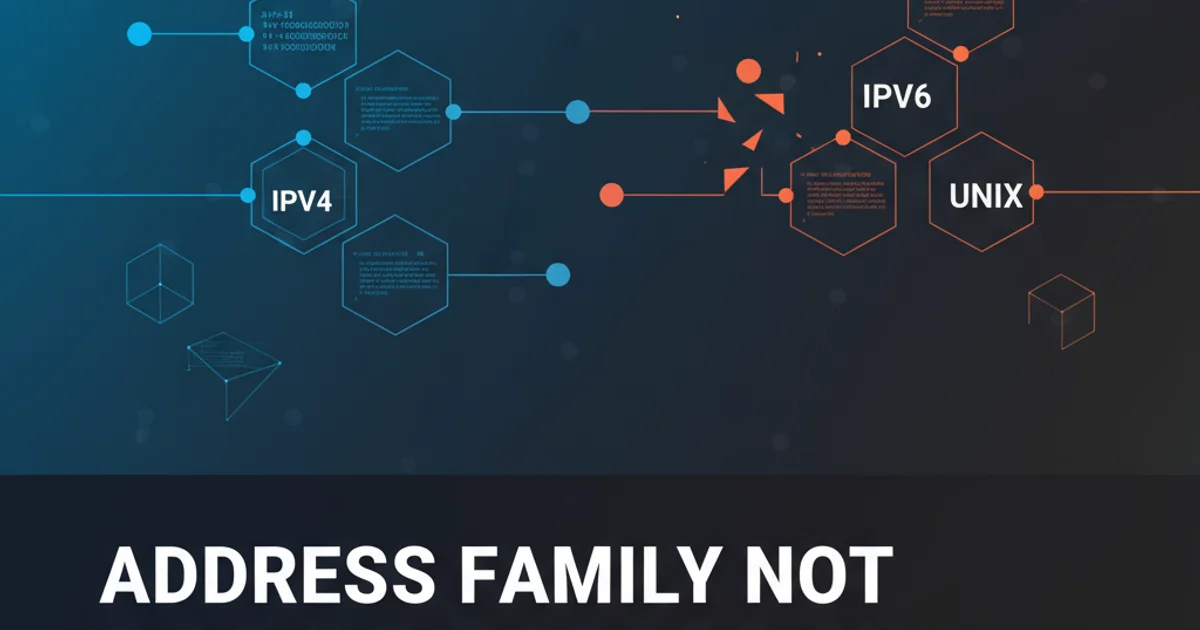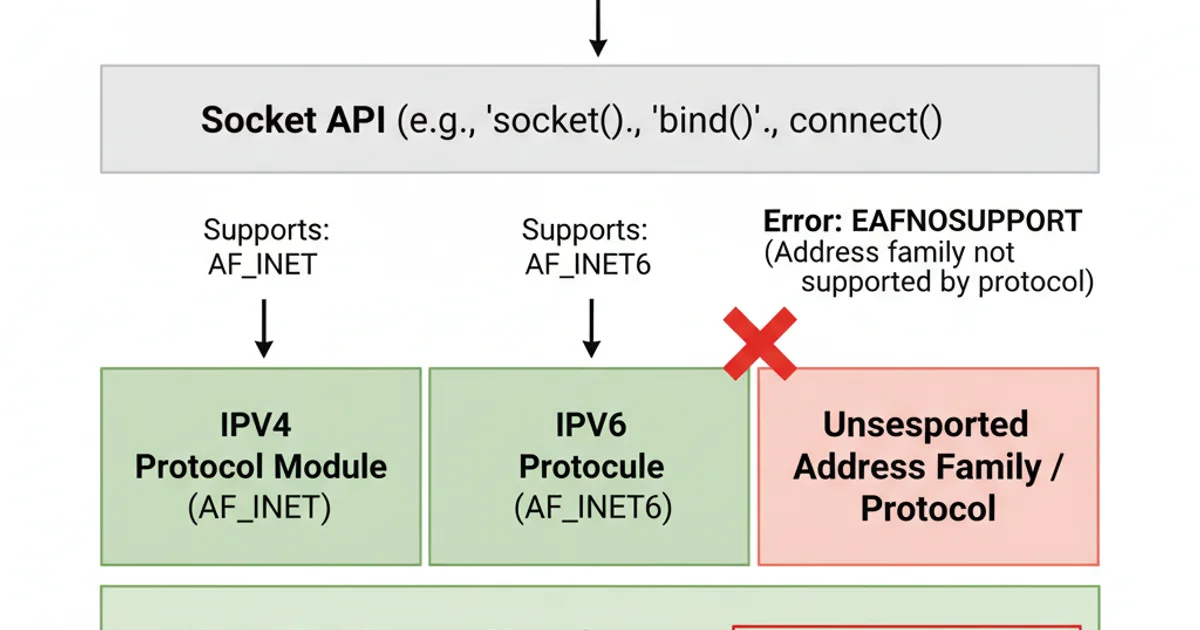Address family not supported by protocol
Categories:
Resolving 'Address family not supported by protocol' in C Sockets

Understand and fix the common 'Address family not supported by protocol' error when working with C sockets, particularly in IPv6 environments on CentOS.
The error message "Address family not supported by protocol" (often seen as EAFNOSUPPORT) is a common hurdle for developers working with network sockets in C, especially when dealing with IPv6. This error indicates a mismatch between the address family specified for a socket (e.g., AF_INET6 for IPv6) and the protocols or configurations available on the system. This article will delve into the causes of this error, provide diagnostic steps, and offer solutions to ensure your socket applications function correctly across different network environments.
Understanding the Error: EAFNOSUPPORT
The EAFNOSUPPORT error code signifies that the requested address family (e.g., AF_INET, AF_INET6) is not supported by the protocol specified, or that the system itself does not have support for that address family enabled. This is particularly prevalent with IPv6 (AF_INET6) on systems where IPv6 might be disabled, misconfigured, or where the kernel modules required for IPv6 support are not loaded. While less common, it can also occur with AF_INET if IPv4 support is somehow compromised.
flowchart TD
A[Socket Creation Request] --> B{Address Family: AF_INET6?}
B -- Yes --> C{System IPv6 Enabled?}
B -- No --> D{Address Family: AF_INET?}
C -- No --> E[Error: EAFNOSUPPORT]
C -- Yes --> F{Protocol Supported?}
F -- No --> E
F -- Yes --> G[Socket Created Successfully]
D -- Yes --> H{System IPv4 Enabled?}
D -- No --> E
H -- Yes --> I{Protocol Supported?}
I -- No --> E
I -- Yes --> GDecision flow for socket creation and EAFNOSUPPORT error
Common Causes and Diagnostics
Several factors can lead to EAFNOSUPPORT. Identifying the root cause involves checking both your application code and the system's network configuration. On CentOS and similar Linux distributions, IPv6 support is usually enabled by default, but it can be explicitly disabled or encounter issues.
socket() and getaddrinfo() functions. They provide crucial error codes that can be translated using perror() or strerror() for more specific diagnostics.Code-Related Issues
The most common code-related issue is requesting an IPv6 socket (AF_INET6) when the system or the getaddrinfo() call cannot provide an IPv6 address or when the socket() function is called with an unsupported protocol type for the chosen address family.
#include <stdio.h>
#include <stdlib.h>
#include <string.h>
#include <unistd.h>
#include <sys/types.h>
#include <sys/socket.h>
#include <netdb.h>
int main() {
struct addrinfo hints, *res, *p;
int status;
char ipstr[INET6_ADDRSTRLEN];
memset(&hints, 0, sizeof hints);
hints.ai_family = AF_UNSPEC; // Allow IPv4 or IPv6
hints.ai_socktype = SOCK_STREAM; // TCP stream socket
hints.ai_flags = AI_PASSIVE; // Fill in my IP for me
if ((status = getaddrinfo(NULL, "3490", &hints, &res)) != 0) {
fprintf(stderr, "getaddrinfo error: %s\n", gai_strerror(status));
return 1;
}
printf("Server IP addresses:\n");
for(p = res; p != NULL; p = p->ai_next) {
void *addr;
char *ipver;
// get the pointer to the address itself,
// different fields in IPv4 and IPv6:
if (p->ai_family == AF_INET) { // IPv4
struct sockaddr_in *ipv4 = (struct sockaddr_in *)p->ai_addr;
addr = &(ipv4->sin_addr);
ipver = "IPv4";
} else { // IPv6
struct sockaddr_in6 *ipv6 = (struct sockaddr_in6 *)p->ai_addr;
addr = &(ipv6->sin6_addr);
ipver = "IPv6";
}
// convert the IP to a string and print it:
inet_ntop(p->ai_family, addr, ipstr, sizeof ipstr);
printf(" %s: %s\n", ipver, ipstr);
int sockfd = socket(p->ai_family, p->ai_socktype, p->ai_protocol);
if (sockfd == -1) {
perror("socket"); // This is where EAFNOSUPPORT might appear
continue;
}
printf(" Socket created successfully for %s.\n", ipver);
close(sockfd);
}
freeaddrinfo(res); // free the linked list
return 0;
}
Example C code demonstrating socket creation and error handling.
System-Related Issues (CentOS/Linux)
On CentOS, IPv6 support is typically enabled by default. However, it can be disabled through kernel parameters or network configuration files. If your system explicitly disables IPv6, attempts to create AF_INET6 sockets will fail with EAFNOSUPPORT.
Troubleshooting and Solutions
Here's a systematic approach to diagnose and resolve the EAFNOSUPPORT error.
1. Check IPv6 Status
Verify if IPv6 is enabled on your CentOS system. You can check the status using ip a or by inspecting kernel parameters. Look for inet6 addresses in the output of ip a.
2. Inspect Kernel Parameters
Check /etc/sysctl.conf or files in /etc/sysctl.d/ for parameters like net.ipv6.conf.all.disable_ipv6 or net.ipv6.conf.default.disable_ipv6. If these are set to 1, IPv6 is disabled. Change them to 0 to enable IPv6. After modifying, run sudo sysctl -p to apply changes or reboot.
3. Verify Network Configuration
Ensure your network interface configuration (e.g., /etc/sysconfig/network-scripts/ifcfg-eth0) doesn't explicitly disable IPv6. Look for IPV6INIT=no or similar settings. Set it to yes if present.
4. Reboot or Restart Network Services
After making changes to kernel parameters or network configurations, a reboot is often the most reliable way to ensure they take effect. Alternatively, restart the network service: sudo systemctl restart network.
5. Adjust getaddrinfo Hints
In your C code, if you specifically need IPv4, set hints.ai_family = AF_INET;. If you need IPv6, set hints.ai_family = AF_INET6;. If your application can work with either, hints.ai_family = AF_UNSPEC; is generally the most flexible option, allowing getaddrinfo to return both IPv4 and IPv6 addresses, and your code can iterate through them.
6. Handle getaddrinfo Results Robustly
When using AF_UNSPEC, iterate through the addrinfo linked list returned by getaddrinfo(). Attempt to create a socket for each addrinfo structure. If one fails with EAFNOSUPPORT, try the next one. This makes your application more resilient to varying network configurations.

The application interacts with the socket API, which in turn relies on kernel modules for specific address family support.
By systematically checking both your application's socket creation logic and the underlying system's IPv6 configuration, you can effectively diagnose and resolve the "Address family not supported by protocol" error. Prioritizing AF_UNSPEC with robust iteration through getaddrinfo results is often the best practice for writing flexible network applications.